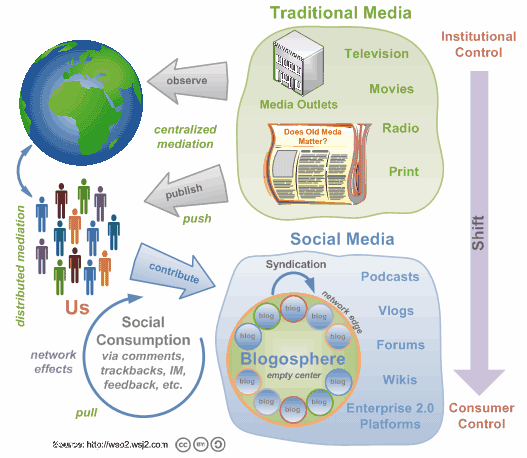Wat verstaan we onder social media?


Dion Hinchcliffe heeft opnieuw een interessant artikel geschreven over de ontwikkelingen in de markt. Dit keer over de trend dat met de toenemende populariteit van social media we eigenlijk steeds meer zouden moeten spreek over social mass media. Hij begint zijn betoog met de definitie van social media:
(…) Social media describes the online tools and platforms that people use to share opinions, insights, experiences, and perspectives with each other. Social media can take many different forms, including text, images, audio, and video. Popular social mediums include blogs, message boards, podcasts, wikis, and vlogs. (…)
Hinchcliffe benadrukt dat social media content door syndicatie snel kan worden verspreid (denk aan RSS-feeds) en worden doorzocht (denk aan Technorati, Google Blog Search, etc) waarmee het een enorm bereik heeft. Aan de hand van Technorati-statistieken, Google Trends en YouTube Factsheet laat hij zien hoe groot dat bereik eigenlijk is en komt langzamerhand op zijn stelling en dat is dat social media eigenlijk gewoon main stream aan het worden is.
Hinchcliffe geeft vervolgens een aantal kenmerken van social media:
- Communication in the form of conversation, not monologue. This implies that social media must facilitate two-way discussion, discourse, and debate with little or no moderation or censorship. In other words, the increasingly ubiquitious comments section of your local blog or media sharing site is NOT optional and must be open to everyone.
- Participants in social media are people, not organizations. Third-person voice is discouraged and the source of ideas and participation is clearly identified and associated with the individuals that contributed them. Anonymity is also discouraged but permissible in some very limited situations.
- Honesty and transparency are core values. Spin and attempting to control, manipulate, or even spam the conversation are thoroughly discouraged. Social media is an often painfully candid forum and traditional organizations — which aren’t part of the conversation other than through their people — will often have a hard time adjusting to this.
- It’s all about pull, not push. Like McKinsey & Company noted a year ago or so , push-based systems, of which one-way marketing and advertising and command-and-control management are typical examples are no where near as efficient as pull systems where people bring to them the content and relationships that they want, instead of having them forced on themselves. Far from being a management theory, much of what we see in Web 2.0 shows the power of pull-based systems with extremely large audiences. As you shape a social media community, understanding how to make embrace pull instead of push is one of the core techniques. In social media, people are in control of their conversations, not the pushers.
- Distribution instead of centralization. One often overlooked aspect of social media is the fact that the interlocutors are so many and varied. Gone are the biases that inevitably creep into information when only a few organizations control the creation and distribution of information. Social media is highly distributed and made up of tens of millions of voices making it far more textured, rich, and heterogeneous than old media could ever be (or want to be). Encouraging conversations on the vast edges of our networks, rather than in the middle, is what this point is all about.
Opnieuw complimenten aan Hinchcliffe voor dit korte maar heldere overzicht!
Mooi overzicht! Laat hij ook nog voorspellingen los op de toekomst?
– Hoe gaat het bedrijfsleven dit gebruiken als marketing? (althans de “reclamebureaus”)
– Hoe ziet social-media er over 10 jaar uit?
Zeker boeiend verhaal! Zou overigens erg interessant zijn inzicht te krijgen in dergelijke statistieken specifiek voor de Nederlandse situatie..
Iemand de domeinnaam social-media.nl hebben? 😛
Goed stuk Marco, mooi overzicht/handige plaat!
Gerelateerde artikelen
Marketingfacts. Elke dag vers. Mis niks!
Marketingfacts. Elke dag vers. Mis niks!